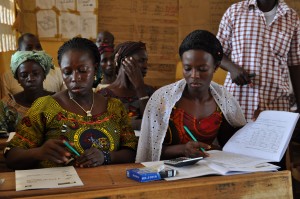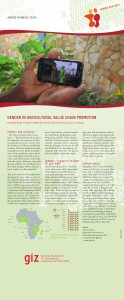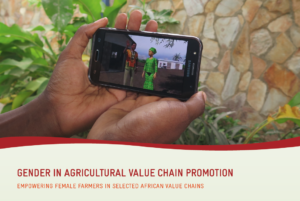 “The African farmer and her husband…” This proverb entails in essence the importance of women in the African agricultural sector: women form the backbone of African smallholder farming. However, significant gender inequalities can be found in people’s access to key productive assets and services: land, labour, financial services, water, rural infrastructure, technology, and other inputs. Moreover, the gender division of labour in rural African families disadvantages women and puts a heavy burden on their shoulders.
“The African farmer and her husband…” This proverb entails in essence the importance of women in the African agricultural sector: women form the backbone of African smallholder farming. However, significant gender inequalities can be found in people’s access to key productive assets and services: land, labour, financial services, water, rural infrastructure, technology, and other inputs. Moreover, the gender division of labour in rural African families disadvantages women and puts a heavy burden on their shoulders.
This issue was actively included when designing the value chain projects of the umbrella programme Agricultural Value Chains for Sustainable Development (A4SD). A4SD provides the umbrella to four large scale projects: the Competitive African Cotton Initiative (COMPACI), the Competitive African Rice Initiative (CARI), the Competitive Cashew Initiative (ComCashew), and the Sustainable Smallholder Agribusiness Link Program (SSAB). These projects work in 15 African countries and have secured – amongst others – funding from the European Union and the Bill and Melinda Gates Foundation and cooperate with more than 150 partners from the public and private sector.
Gender – a quality feature of our work
A4SD’s overall goal is to contribute to the achievement of the Sustainable Development Goals (SDGs) by promoting selected agricultural value chains and by mobilizing private sector interest in (gender)-inclusive business with smallholder farmers. A4SD stimulates women’s active participation and gender equality in all segments of the value chain. It does so e.g. by means of animated videos and gender training materials. A4SD addresses stakeholders from female farmers’ to extension agents, to women active in processing, to female sector experts. In the trainings, men and women learn side by side how to apply Good Agricultural Practices (GAP) on their fields. Farmer Business School (FBS) strengthens smallholders’ business attitudes, their management and bookkeeping skills. These are necessary to be able to get a credit or to access other agricultural inputs, important points to strengthen female farmers’ agency.
Gender impact
The projects have had considerable impact on the lifes of women. Thus, more than 1.8 million farmers have been trained in GAP and in FBS – 400,000 of them were women. On average, men and women increased their income by up to 150% by implementing lessons learnt in GAP and FBS training.
A farmer’s testimony: After attending FBS training, the life of Bibiane Ndzana seriously changed: “After FBS in 2012, I do my cropping calendar and my operating account for my farms regularly. I apply the Good Agricultural Practice and plan my expenditure. I save and I am qualified for loans. I diversified production including groundnut. I increased my profit from 1,200 EUR from 4 hectares in 2013, to 5,500 EUR from 6.5 hectares in 2015. I pay my children’s school fees easily now.”
Full information: 2018 EN GenderAward RollUp A4SD
Competition entry: 2018 EN Project Documentation A4SD Gender Factsheet
Download their contribution to the Gender Slam: Gender Slam A4SD Gender Slam
Watch how Ardiata Traoré became Production Manager in the Burkinabé cashew factory Gebana Burkina Sarl after participating in the Competitive Cashew Initiative’s Master Training Programm: Video
Have a look at the pictures of the Gender Slam Team performing:
Have a look at the results of the second screen survey during the Gender Award Ceremony:
GIZ staff may have a look at the recording of the Gender Slam and the Award Ceremony.
——————————————————————————–
Contact details:
Johannes Peters
A4SD Gender Focal Person
E: johannes.peters@giz.de
I: www.a4sd.net

 GIZ Gender Website
GIZ Gender Website



